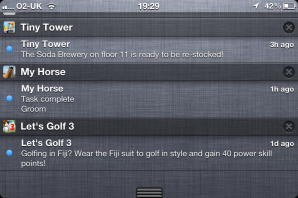How To Make People Hate Free Stuff

How can you make people hate free stuff? Everyone likes free stuff. It’s free.
And yet, I’ve noticed something funny happening when I’m browsing the iOS App Store. I’m seeing games with the word ‘FREE’ where the price should be, and thinking “Ugh, eff that.”
That can’t be right, can it?
Don’t get me wrong, there are a lot of decent – nay, amazing – free games on the App Store. Some, like the brilliant Magnetic Billiards, offer up a certain amount of the game’s content for free, with the rest being unlocked via an in-app purchase. Some people consider this approach deceptive – they think they’re getting a full, free game, and get upset when this turns out to be untrue – but personally I feel terrible getting good games for free anyway, so this viewpoint baffles me. Some ‘free’ games normally cost money, but are given away for free for a limited time as a promotional thing. Others, meanwhile, are permanently free because the people who made them are just nice.
 All of this, obviously, is fine.
All of this, obviously, is fine.
But there’s another kind of free game that spoils the fun for everyone. The games that you could – could – play entirely for free, but they’re very keen on reminding you at every turn that, hey, they could really use your money right now.
The games that are likely to do this aren’t difficult to spot. They’re free to download, obviously, and generally involve raising an animal, or building or running something. Something that requires maintenance. Now, comparisons to the likes of FarmVille are obvious – especially with FarmVille itself having been ported to iOS – but the very act of taking a FarmVille-esque game out of Facebook and putting it on your always-on-the-internet smartphone has enormous potential for making it even more insipid than before. Because instead of having a game that is designed to make you think about it while you’re not playing it, you’ve suddenly got a game that you are always playing because it is on your goddamn phone and it keeps buzzing at you whenever something happens that requires your attention which is very often indeed.
 Tiny Tower is a shining/stinking example of this. The worst kind of FarmVille clone that slipped through everyone’s bullshit sensors by way of cutesy pixellated visuals, you could barely leave the app closed for five minutes before it fired yet another notification at you, letting you know that you needed to open the app again and click on some stuff, or else you’re WASTING TIME. Your tower is forever judged against those built by your friends, and so the whole thing is an endless race where efficiency is king.
Tiny Tower is a shining/stinking example of this. The worst kind of FarmVille clone that slipped through everyone’s bullshit sensors by way of cutesy pixellated visuals, you could barely leave the app closed for five minutes before it fired yet another notification at you, letting you know that you needed to open the app again and click on some stuff, or else you’re WASTING TIME. Your tower is forever judged against those built by your friends, and so the whole thing is an endless race where efficiency is king.
Oh, but there’s a way to speed things up, and put up with fewer notifications while you’re at it. By coughing up real-life cash money, you can make stuff happen instantly, rather than being forced to wait minutes or hours for an action to complete. Now, don’t get me wrong – I like to see developers getting paid for their work. But if the only way to do that is by badgering the player, or implementing a ‘pay us money or your game will slow right the fuck down’ mechanic, it becomes vulgar and tiresome.
Organising the construction and running of a tower can be a fun game in and of itself. A game worth paying money for, no less – look at Mega Mall Story. But not so much if you’re feeling the need to pay money just so it will shut up and leave you alone.
Rating even higher on the insipidity chart is Gameloft’s Let’s Golf 3. Now, there’s nothing inherently wrong with the Let’s Golf series. Unlike most of Gameloft’s ‘original’ IPs, this one isn’t clearly aping an existing big-budget console franchise. They’re just harmless, enjoyable golf games. Except they decided to make the third iteration massively irritating, by not charging any money for it!
 Again, the game is funded via in-app purchases, which isn’t necessarily evil. What is evil, is that not only is it impossible to play a full 18-hole course without paying money for some more ‘energy’, but when you’re not playing the game, it’ll occasionally remind you that you can open the app up and spend money. It’s probably safe to assume that, when you told the game you were okay with it sending push notifications, you didn’t realise you were just consenting to having advertisements appear on your phone in the same manner as a text message, but hey ho! Deal with it. Or, better yet, delete the app.
Again, the game is funded via in-app purchases, which isn’t necessarily evil. What is evil, is that not only is it impossible to play a full 18-hole course without paying money for some more ‘energy’, but when you’re not playing the game, it’ll occasionally remind you that you can open the app up and spend money. It’s probably safe to assume that, when you told the game you were okay with it sending push notifications, you didn’t realise you were just consenting to having advertisements appear on your phone in the same manner as a text message, but hey ho! Deal with it. Or, better yet, delete the app.
It’s thanks to games like these that spotting a free game on the App Store is now an experience akin to a stranger offering to buy you a drink. It puts you on your guard as you eye them carefully, trying to fathom their true motive. Because there’s no way they’re just being nice, is there?
Again – I’ve got no issue with developers or publishers trying to get paid. But there are ways to make microtransaction-funded games that don’t harass people or piss them off, and more industry folks need to figure that out before the word ‘FREE’ becomes utterly meaningless or, worse still, inherently worthy of scorn.
Just by checking App Store reviews, Twitter or gaming forums you can already see people becoming wary of any game – even a genuinely great one – that features in-app purchases thanks to the irritation and, in some cases, controversy they can cause. And those people might be blinkered, reactionary divs. But a lost sale is a lost sale, and a world where decent developers have one less way of generating interest in their work is a poorer one indeed.